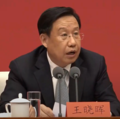List of the CCP Sichuan Committee secretaries
| No. | Image | Name | Term start | Term end | Ref. |
|---|---|---|---|---|---|
| 1 |  | Li Jingquan (1909–1989) | September 1952 | February 1965 | [1] |
| 2 | Liao Zhigao (1913–2000) | February 1965 | January 1967 | [2] [3] | |
| Cultural Revolution Interregnum | 1967 | 1971 | |||
| 3 |  | Zhang Guohua (1914–1972) | August 1971 | February 1972 | [4] |
| 4 |  | Liu Xingyuan (1908–1990) | March 1972 | October 1975 | [5] |
| 5 |  | Zhao Ziyang (1919–2005) | October 1975 | March 1980 | [5] |
| 6 | Tan Qilong (1913–2003) | March 1980 | February 1983 | [6] [5] | |
| 7 | Yang Rudai (1926–2018) | February 1983 | March 1993 | [7] [8] | |
| 8 | Xie Shijie (born 1934) | March 1993 | January 2000 | [9] | |
| 9 |  | Zhou Yongkang (born 1942) | 6 January 2000 | 5 December 2002 | [10] |
| 10 | Zhang Xuezhong (born 1943) | 5 December 2002 | 3 December 2006 | [11] | |
| 11 |  | Du Qinglin (born 1946) | 3 December 2006 | 2 December 2007 | [12] |
| 12 |  | Liu Qibao (born 1953) | 2 December 2007 | 21 November 2012 | [13] |
| 13 |  | Wang Dongming (born 1956) | 21 November 2012 | 21 March 2018 | [14] |
| 14 |  | Peng Qinghua (born 1957) | 21 March 2018 | 22 April 2022 | [15] |
| 15 |  | Wang Xiaohui (born 1962) | 22 April 2022 | Incumbent | [16] |
